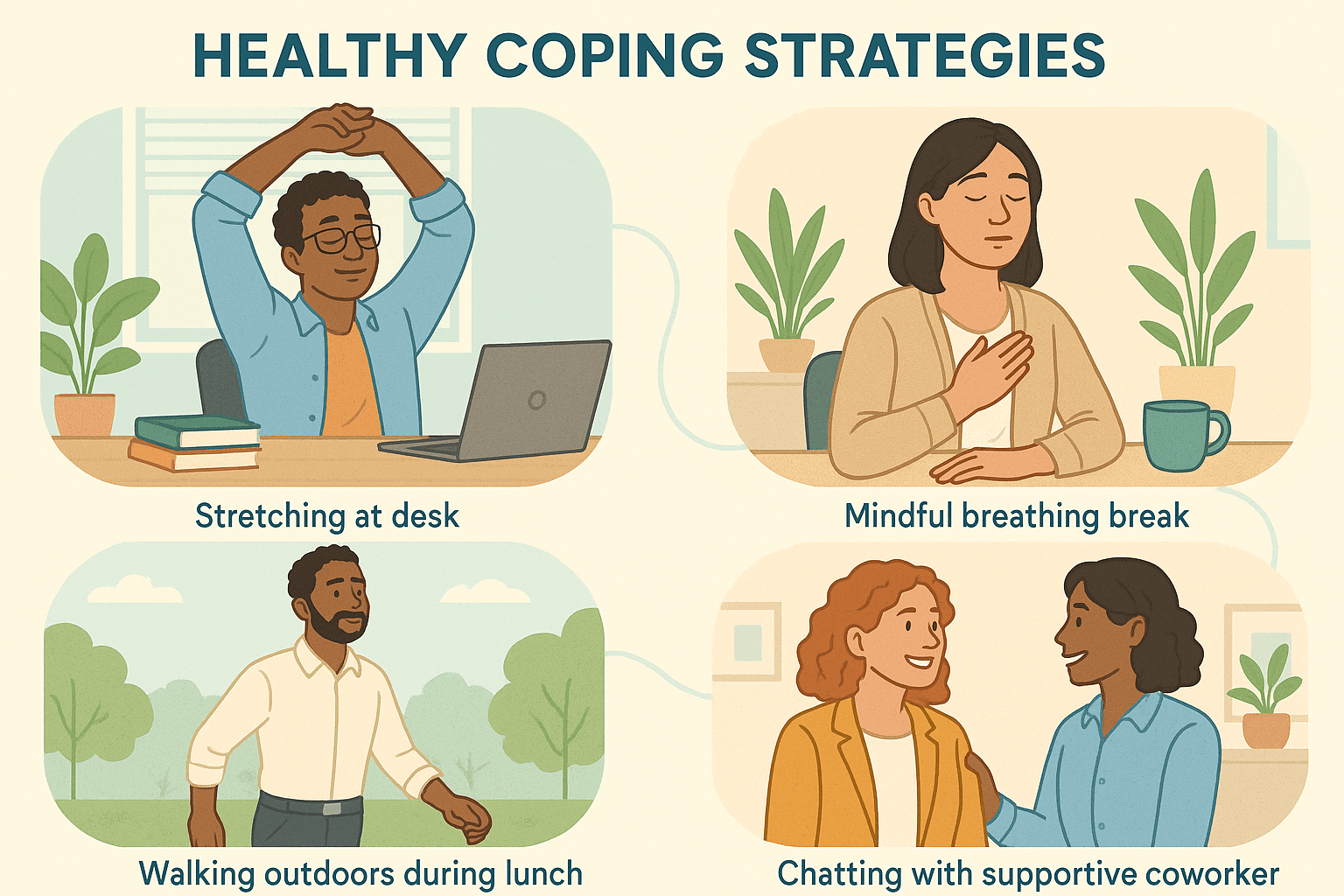How to Manage Stress at Work and Protect Your Mental Well-being

Modern workplaces can be fast-paced, demanding, and unpredictable. From constant deadlines to endless notifications, many professionals find themselves running on empty before the week is even halfway through. Learning how to manage stress at work isn’t just about surviving a busy schedule—it’s about building long-term habits that help you stay grounded, focused, and emotionally balanced.
As a therapist, I often hear clients describe the exhaustion that comes from juggling multiple responsibilities while trying to stay professional and composed. The good news is that stress doesn’t have to control you. With the right tools and self-awareness, you can learn to work effectively while maintaining your mental health.
Understanding Work Stress
Stress at work often stems from a combination of external pressure and internal expectations. Common triggers include:
- Heavy workloads or unrealistic deadlines
- Lack of control or unclear communication
- Difficult coworkers or unsupportive management
- Job insecurity or rapid changes in the workplace
- Perfectionism and fear of failure
Recognizing which of these stressors affects you most is the first step toward regaining control. Once you can name what’s overwhelming you, it becomes easier to identify what needs to change.
The Mind-Body Connection
When stress builds up, the body responds as if it’s under threat. Your heart rate increases, breathing becomes shallow, and muscles tense. Over time, this constant state of alertness leads to fatigue, headaches, and even burnout. Emotionally, it can cause irritability, anxiety, or a sense of hopelessness.
That’s why how to manage stress at work involves more than productivity hacks—it requires nurturing both your mind and body. Grounding techniques, mindful breaks, and emotional regulation all work together to calm the nervous system so you can think clearly again.

Practical Steps to Reduce Stress
Here are some evidence-based strategies that can make a real difference in your daily routine:
1. Prioritize and Plan
Start each day by identifying your top three priorities. Focusing on the most important tasks first helps you feel productive without getting lost in busywork. Break large projects into smaller steps and permit yourself to celebrate progress, not just completion.
2. Set Healthy Boundaries
If your workload consistently exceeds your capacity, it’s okay to communicate your limits. Setting boundaries—such as not checking email after hours or declining unnecessary meetings—is an act of self-respect, not laziness. Clear limits protect your time and energy.
3. Take Short, Mindful Breaks
Research shows that regular breaks improve focus and reduce errors. Step away from your desk for five minutes every hour. Stretch, breathe deeply, or simply look out a window. These micro-pauses help reset your nervous system and prevent tension from accumulating.
4. Create a Supportive Environment
Stress thrives in isolation. Build positive connections with colleagues who listen and understand. A few kind conversations throughout the day can remind you that you’re not alone in your struggles. If your workplace feels competitive or toxic, focus on nurturing supportive relationships outside of work as well.
5. Move Your Body
Physical activity is one of the most effective ways to relieve stress. Even a 10-minute walk can lower cortisol levels and boost mood. Find small ways to move—take the stairs, stretch at your desk, or schedule a lunchtime walk. Your body will thank you for it.
6. Practice Mindfulness or Deep Breathing
When you notice your mind racing, pause for a few slow breaths. Inhale deeply through your nose, hold briefly, and exhale through your mouth. This simple technique reduces anxiety and helps you stay present. Incorporating a few minutes of mindfulness or meditation each day can build long-term resilience.
7. Separate Work from Home
The shift to remote and hybrid work has blurred boundaries for many people. Create rituals that signal the end of your workday—a short walk, changing clothes, or turning off notifications. These cues tell your brain it’s time to relax and recharge.

When Stress Becomes Too Much
Occasional pressure can motivate you, but chronic stress is a warning sign. If you find yourself constantly exhausted, unable to focus, or feeling detached from your job, it might be time to reassess. Burnout doesn’t happen overnight—it builds slowly until you no longer have the energy to cope.
Knowing how to manage stress at work also means recognizing when to ask for help. Talking to a supervisor about workload adjustments, using employee assistance programs, or seeking therapy can all make a difference. Professional support can help you explore coping strategies, challenge negative thought patterns, and restore a sense of control.
Long-Term Resilience
The goal isn’t to eliminate all stress—it’s to respond to it in healthier ways. Developing long-term habits such as regular exercise, balanced nutrition, adequate sleep, and emotional awareness strengthens your ability to handle challenges. Over time, these small choices build resilience so that setbacks feel manageable rather than overwhelming.
Learning how to manage stress at work is an ongoing process. Be patient with yourself as you experiment with what works best. Sometimes simply taking one deep breath before a meeting or turning off your phone at lunch can make a meaningful difference.
Final Thoughts
Work stress is inevitable, but suffering from it doesn’t have to be. By identifying triggers, setting boundaries, and taking care of your mental and physical health, you can build a healthier relationship with your job. Small changes today can prevent burnout tomorrow.
If you find that stress from work is affecting your sleep, relationships, or confidence, it may be time to reach out for help. Talking to a therapist can provide a safe space to process your experiences and develop personalized tools for balance and wellbeing. Contact me today to start that conversation—we can work together to create a calmer, more fulfilling work life where you thrive, not just survive.